Catholic Communications, Sydney Archdiocese,
 According to his carers at his nursing home in Innsbruk, Austria the final words of the Most Rev John Jobst, the Bishop Emeritus of Broome were about the people of the Kimberley and the region he not only loved but where he served for just under 37 years.
According to his carers at his nursing home in Innsbruk, Austria the final words of the Most Rev John Jobst, the Bishop Emeritus of Broome were about the people of the Kimberley and the region he not only loved but where he served for just under 37 years.
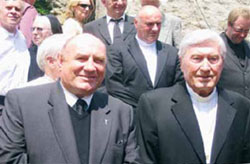
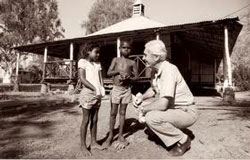
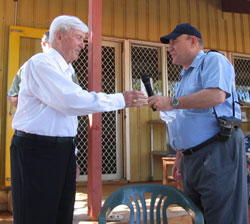
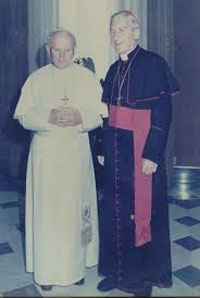
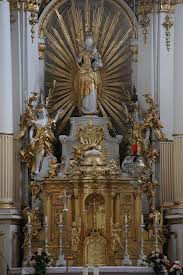
7 Jul 2014
Bishop John Jobst, SAC, Emeritus Bishop of Broome who died in Innsbruk Australia aged 94
Bishop Jobst died on Friday evening, 4 July. He was 94.
"I was told by his carers that is last words were about the Kimberley and wanting to return there. 'I must go back to the Kimberley. I want to see them (the people). I want to see they are cared for,'" the Most Rev Christopher Saunders, the current Bishop of Broome told Catholic Communications this morning.
Regarded with great affection by those in the diocese of Broome and in particular for his work amongst the aboriginal people, the missionary priest was made Vicar-Apostolic of Kimberley in Western Australia in January 1959 and Bishop of Broome in 1966.
"As the first Bishop of Broome and during his years as Apostolic Vicar of the Kimberley, he broke new ground in education in the north of Australia and he served us well with his selfless commitment to the people and to the region," Bishop Saunders said. "I give thanks to Almighty God for taking the Kimberley forward in faith and establishing the Diocese as a particular and vibrant Church dedicated to the ministry of Aboriginal people."
Archbishop Denis Hart, President of the Australian Bishops Conference remembered the German born prelate with deep affection and gratitude as a man of "integrity, priestly goodness and a true missionary."

Bishop Christopher Saunders with Bishop John Jobst at celebrations for 60th anniversary since Austrian bishop's ordination as a priest
"His care of the Diocese of Broome and its Aboriginal people was highly esteemed. May the Lord grant him the reward of his labours. May he rest in peace," he said.
A Pallottine missionary, Bishop Jobst's love and care for Australia's first peoples is well known, with many remarking that the man who did so much for Aboriginal people and passed away as the Diocese of Broome began early celebrations for NAIDOC week, this week, and which celebrates Aboriginal culture, history and achievements.
Bishop Jobst's passing also took place on the eve of Aboriginal and Torres Strait Islander Sunday which is celebrated on the first Sunday of July each year.
Instrumental in helping establish Pallottine scholarships and study grants for Aboriginals and concerned for the welfare and pastoral care of Australia's first peoples after his retirement to Europe in 1995, Bishop Jobst continued regular visits to his former diocese and his beloved Kimberley.

First Bishop of Broome, the Most Rev John Jobst was a champion and advocate for Australia's Indigenous people
Bishop Saunders also kept in close touch and while overseas in March this year was able spent time with Bishop Jobst at his Innsbruk nursing home. While physically frail he found the prelate alert and vitally interested in what was going on in his forcer diocese, and keen to know about the people, the region and the strides being made in the pastoral care as well as in education, health, housing and employment of Australia's first peoples.
Now on a sadder mission, Bishop Saunders is about to return to Europe to attend the Requiem Mass for German-born Bishop Jobst which will be held at Bavaria's Frauenzell Church at 10AM on Friday 18th July.
The Mass will be followed by burial at Bishop Jobst's birthplace of Brennberg which lies west of Regensburg.

First Bishop of Broome John Jobst seen here with current Bishop of Broome Christopher Saunders in 2005
Born in 1920 and baptised Johannes - John when translated to English - he was the son of devout Catholic parents and on leaving school joined the Pallottines as a seminarian, only to be drafted into the German Army at the outbreak of World War II.
Attached to a Panza Regiment, Bishop Jobst served as a medical officer. He was wounded during service at the Russian Front. Hospitalised as a result of the injuries, he would later spend time as a prisoner-of-war under the Americans.
"As a POW he was also in charge of a detail that collected the bodies of German soldiers who had died from cold or starvation overnight," Bishop Saunders said.
But despite enduring such difficult times, Bishop Jobst never lost his faith and when World War II finally ended, he resumed his studies with the Society of the Catholic Apostolic, otherwise known as the Pallottines, the missionary order founded by St Vincent Pallotti.

Bishop John Jobst with St John Paul II
Ordained a priest on 9 July 1950, Bishop Jobst was appointed to Australia together with Father John Lenmann with a specific mission to help Aboriginal people. He began his first ministry at Beagle Bay, north of Broome. Later, he was appointed Spiritual Director of the Pallottine Australian House of Studies and in late 1958 was named Apostolic Vicar of the Kimberley.
In charge of a sprawling Vicariate of 773,000 square kilometres, and later one of the largest dioceses in Australia, Bishop Jobst became the first Bishop of Broome when the Vicariate was raised to a diocese in 1965.
Bishop Saunders was just 21 years old when he first met Bishop Jobst and as a young man was "at the cross-roads".
Constantly on the move while growing up, he attended eight different schools in Sydney, Melbourne and the UK before beginning training with the Columbans Missions Congregation. But after three years of study, he had left.
"I knew I wanted to continue in the priesthood but I realised I didn't want to be a priest overseas," Bishop Saunders recalls and says this is when a friend suggested he meet Bishop Jobst who happened to be in Melbourne at the time.

Bishop Jobst's Requiem Mass will be held at Frauenzell Church near his birthplace of Brennberg in Bavaria
The student missionary priest and Bishop Jobst talked many times over the next few weeks which led to Bishop Saunders discovering his true calling and offering himself as the newly formed Diocese of Broome's first student priest.
Sent by the Diocese of Broome to a provincial seminary in Adelaide to study for the priesthood he was ordained by Bishop Jobst in 1976 and became the first priest for Australia's youngest diocese.
Bishop Saunders has been there ever since.
Ordained a Bishop in February 1996, he became the second Bishop of Broome after Bishop Jobst retirement the previous year.
During his time in Broome Bishop Jobst also attended all four sessions of Vatican 11 but his affection for the "top-end" and the people of the Diocese of Broome was well known, returning to Broome on several occasions following his retirement.
However on 9 July 2011 which marked the 60th anniversary of the German prelate's ordination as a priest, Bishop Saunders flew to Germany to participate in the celebrations in the village of Brennberg, and to be among the concelebrants at the Diamond Jubilee Mass.
Among those who attended included Bishop Jobst's sister, Amanda, a Pallottine Sister who for many years worked in South Africa with orphans and AIDS victims.
Shared from Archdiocese of Sydney
Comments